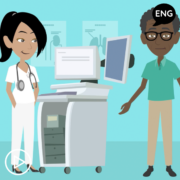Tag Archive for: prostate cancer care
What Questions Should You Consider Asking Your Prostate Cancer Care Team?
What Questions Should You Consider Asking Your Prostate Cancer Care Team? from Patient Empowerment Network on Vimeo.
How can prostate cancer patients have engaged conversations with their healthcare team? This animated video reviews key questions patients can ask to help them navigate their treatment and care decisions.
See More From Shared Decision Making: Navigating Prostate Cancer Care
Related Resources:

Building a Relationship With Your Prostate Cancer Healthcare Team |

|

|
Transcript:
Niki:
Hi, I’m Niki, and I’m a prostate cancer nurse practitioner. And this is Anthony, who is living with advanced prostate cancer.
[Disclaimer on screen: Patient experience depicted in this video is fictional.]
Anthony:
Thanks for joining us! In this video, Niki and I are going to walk you through key questions to ask your prostate cancer team as you navigate your care decisions.
First of all, it’s helpful to ask your physician how much experience they have treating prostate cancer patients. If appropriate, you may want to consider a second opinion.
Niki:
And it’s important to also have a deeper understanding of your disease by asking:
- What stage and grade is the prostate cancer? Has it spread beyond the prostate?
- Are there additional tests that you should undergo to provide a fuller picture of your disease?
- What educational resources are recommended to learn more about prostate cancer?
Anthony:
Once you understand more about your diagnosis and disease, then it’s time to really understand what steps could be next.
And, if – and when – your disease does need to be treated, you should feel engaged in deciding on your treatment plan.
Niki:
That’s right. You can start by asking if treatment needs to begin right away or if you will be monitored for any changes.
- Then, establish the goals of your treatment plan. Based on your diagnosis and stage of disease, is the goal to try to cure the cancer or to manage the disease symptoms?
- Ask what treatment options are available to you and which approach is recommended for YOUR disease?
- And inquire if there is a clinical trial that could be right for you.
- Finally, ask what your options are if the initial treatment doesn’t appear to be effective or if your disease progresses.
Once you know your options, ask about the potential short term and long-term side effects of each approach and how they may be managed.
Anthony:
You should also find out how your lifestyle may be impacted. For instance:
- Find out how each approach could impact your daily life, including your sex life, and for how long.
- You may also inquire about how treatment may impact fertility and if you should speak with a fertility specialist.
- Ask about the financial implications of each approach and whether there are resources for financial assistance.
Niki:
That’s great advice, Anthony. We hope these questions give you a good starting point for engaged conversations with your team. Remember, you may have more questions related to your individual situation, these are just a starting point to help.
Anthony:
Don’t forget to download the guide that accompanies this video. It will have a comprehensive list of the questions we have reviewed.
And visit powerfulpatients.org/PC to access more videos with Niki and me.
You Have a Role in Your Prostate Cancer Care Decisions
You Have a Role in Your Prostate Cancer Care Decisions from Patient Empowerment Network on Vimeo.
What role do patients play in their prostate cancer care decisions? This animated video reviews the shared decision-making process and outlines steps for patients to engage in their care.
See More From Shared Decision Making: Navigating Prostate Cancer Care
Related Resources:

Building a Relationship With Your Prostate Cancer Healthcare Team |

|

|
Transcript:
Niki:
Hi, I’m Niki, and I’m a prostate cancer nurse practitioner. And this is Anthony, who is living with advanced prostate cancer.
[Disclaimer on screen: Patient experience depicted in this video is fictional.]
Anthony:
Thanks for joining us! In this video, we’re going explain why you should take an active role in your prostate cancer care and review steps to help you engage in the decisions that need to be made.
Niki:
That’s right, Anthony.
Which leads me to the term “shared decision-making.” You may have heard of this term already – basically, it means that you and your healthcare team collaborate on care decisions and the goal is to have YOU be at the center of these decisions.
Anthony:
That’s right! For example, when it was time to discuss my care plan, my doctor walked me through the considerations of each approach and how each option could impact my lifestyle. I asked questions and shared my goals during the conversations. And I felt HEARD.
Niki:
Exactly – that’s shared decision-making in action. When you are living with cancer, often the risks and benefits need to be weighed to decide which course of action could be best for your individual disease. So why is it so vital to be an active participant? Studies show that patients who engage in their care may have better outcomes and experiences1. And it will help you learn more about your disease and move forward with confidence.
Anthony:
Now that you know what shared decision-making IS and why you should become a partner in your care, let’s review steps that will help you become more engaged:
The first, and most important step, is to educate yourself about your disease.
Niki:
Your doctor’s office can be a great source of information and resources, so it’s a good place to start. And there are also several advocacy groups that provide educational materials, for instance: [links on screen as they are read]:
- Patient Empowerment Network, the creator of this video.
- The Prostate Cancer Foundation.
- The Prostate Cancer Research Institute.
- The Prostate Health Education Network, which focuses on services and support for Black men.
- And ZERO-The End of Prostate Cancer.
Anthony:
Once you learn more about your prostate cancer through resources like these, you will feel more empowered to voice your opinions. Remember, it’s important to speak up and ask questions at each stage.
Niki:
So, what else can you do to be a partner in your decisions?
- First, make sure you understand and communicate the goals of your care before making any decisions.
- Then, make sure you are informed about your options and ask for supporting materials if you need clarity.
- And ask how your lifestyle may be impacted by each approach.
- You should also discuss the risks and benefits of each option.
- Request resources to aid in decision-making and information that can help determine the best route for your individual disease.
- As always, bring a friend or family member and discuss your options with loved ones.
- Finally, remember YOU are at the center of your care. You should feel comfortable with any choice before you move forward.
Anthony:
Now that you’ve watched this video, make sure to download the guide that contains highlights of this discussion – and you can print it out or save it on your computer to reference in the future.
Niki:
Visit powerfulpatients.org/PC to access more videos with Anthony and me. Thanks for joining us!
Building a Relationship With Your Prostate Cancer Healthcare Team
Building a Relationship With Your Prostate Cancer Healthcare Team from Patient Empowerment Network on Vimeo.
Who are the potential members of your prostate cancer team? This animated video reviews the key providers who may be involved in your care and provides tools for confidently communicating with team members.
See More From Shared Decision Making: Navigating Prostate Cancer Care
Related Resources:

|

|

|
Transcript:
Niki:
Hi, I’m Niki, and I’m a prostate cancer nurse practitioner. And this is Anthony, who is living with prostate cancer. Thanks for joining us!
[Disclaimer on screen: Patient experience depicted in this video is fictional.]
Anthony:
In this video, we’re going to walk you through the members of your prostate cancer healthcare team – and share tips for building strong relationships and communicating more effectively.
Niki:
When it comes to prostate cancer, you need a team that collaborates on all aspects of your care. And it’s vital that you utilize ALL the members. After all, they are there to help you.
So, who IS on your team?
There are several different providers who may be involved with your prostate cancer diagnosis and care:
- Let’s start with a urologist. This is a doctor who specializes in the male reproductive organs and can perform prostate cancer surgery. Some are also trained oncologists – urologic oncologists – who are specially trained in cancer.
- Then there could be a radiation oncologist. This team member specializes in treating prostate cancer with radiation.
- Next, there may also be a medical oncologist. This is a physician who is trained in non-surgical prostate cancer approaches, such as hormonal therapy and chemotherapy.
- And, finally, your primary care physician should also be kept in the loop.
Anthony:
And beyond your doctors, there is a whole team of supportive professionals to help you along the way. For instance:
- A nurse like Niki can provide you with information to help with decisions and share advice for managing day-to-day issues, including symptoms and side effects. You may also want to work with a nurse navigator, who is specially trained to help guide you through your cancer care.
- A social worker can help you navigate the details of your care and suggest support resources for you and your family.
- And a palliative care specialist can work with you on helping to relieve symptoms, pain, and even stress-related issues like anxiety and depression.
Niki:
There are several other team members you can rely upon, including:
- A pharmacist, who can dispense prescription medications and inform you of their use and potential side effects.
- A genetic counselor, who has special training in helping patients understand their genetic testing options and the potential impact of the results.
- And don’t forget mental health professionals. Treating your mental health is just as important as treating the prostate cancer itself.
Anthony:
Exactly. I struggled emotionally when I was diagnosed, so I reached out to the social worker, who connected me with a counselor and support groups. Seeing a professional and joining a group made feel less alone and more hopeful.
Niki:
And last, but not least, a care partner or loved one is another core member of your team.
Anthony:
Absolutely! Whether it’s a friend or family member, having someone with you at appointments or to talk about your options is beneficial.
Now that you know who may be on your team, let’s talk about strengthening communication. By communicating effectively, you can learn about your disease and become an active partner in care decisions. Here are a few tips to help you:
- First, make sure everyone on your team is aware of your care goals.
- And bring someone to appointments to help you write down important information and make sure to request post-visit summaries to help you retain the information.
- Ensure you have access to your patient portal and use the messaging service to communicate directly with your team members. Ask follow-up questions about your appointment if necessary.
- Finally, it’s essential to speak up in appointments. Your team wants to hear your questions and know how you are doing. It could help them adjust your care plan.
Niki:
Thank you for joining us – we hope you feel more empowered! And remember to download the guide that accompanies this video to review what we discussed.
Understanding Your Prostate Cancer Diagnosis
Understanding Your Prostate Cancer Diagnosis from Patient Empowerment Network on Vimeo.
What do you need to know about your prostate cancer diagnosis? This animated video reviews the diagnosis process and provides steps for working with your healthcare team to understand your individual disease.
See More From Shared Decision Making: Navigating Prostate Cancer Care
Related Resources:

|

Building a Relationship With Your Prostate Cancer Healthcare Team |

|
Transcript:
Niki:
Hi! I’m Niki, and I’m a prostate cancer nurse practitioner. And this is Anthony, who is living with prostate cancer.
[Disclaimer on screen: Patient experience depicted in this video is fictional.]
Anthony:
In this video, we’ll help you understand prostate cancer and how it is diagnosed and staged.
Niki:
So, what is prostate cancer exactly? It starts when cells in the prostate gland grow out of control, forming a cancerous tumor.
It’s the second most common cancer in American men. And while it can be serious, there are options available for prostate cancer care.
Anthony:
And there are certain risk factors that may make you more likely to develop prostate cancer, such as:
- Your age.
- Your race and ethnic background. For instance, Black men are more likely to be diagnosed with prostate cancer than men of other races.
- Your family history and your genetics.
Niki:
That’s right, Anthony. Now that we have a better understanding of what prostate cancer is, let’s move on to how it is diagnosed.
Your healthcare team will use a variety of tests to better understand your disease.
For example, A PSA test [PSA: Prostate-Specific Antigen on screen] and a biopsy may be used to confirm a diagnosis. And imaging tests—like an MRI or CT scan—are used to find out if the cancer has spread.
These test results also help your doctor stage your disease. Staging helps indicate the location of the cancer, whether it has spread beyond the prostate, and its impact on other areas of the body. It may also assist in guiding a patient’s treatment plan.
When staging prostate cancer, doctors may consider:
- The size of the primary tumor and where it is located.
- They’ll also factor in if the cancer has spread to nearby lymph nodes or other parts of the body.
- The patient’s PSA level is also used in staging. This test measures the amount of prostate-specific antigen in the blood.
- And finally, the cancer’s grade, which is based on the Gleason score. A Gleason score measures how likely the cancer is to spread and whether it is aggressive.
Anthony:
Thanks for explaining that, Niki. So, what are the stages of prostate cancer?
Niki:
Great question!
- Prostate cancer stages begin at stage I, which indicates a slower growing disease that is confined to the prostate.
- And stage II means the cancer is only in the prostate, but the disease may have an increased chance of growing or spreading.
- Stage III prostate cancer indicates that the tumor has spread to areas close to the prostate and may be considered locally advanced.
Anthony:
And I was diagnosed with stage IV prostate cancer, which means it has spread beyond the prostate and is considered advanced prostate cancer.
Niki:
That’s right. And because prostate cancer staging is complicated, it’s important to review test results with your doctor to understand your stage and grade. If you don’t understand your diagnosis, make sure to ask questions and request resources to help you.
Anthony:
Here are some additional steps you can take to feel more confident about understanding your diagnosis:
- First, ask about the stage of your prostate cancer and whether it is aggressive.
- And confirm that you have had all relevant testing to inform an accurate diagnosis, including genetic testing, if appropriate.
- Then, be sure to review the test results together with your team to make sure you understand how they impact your care and treatment options.
- Also, ask about your Gleason score and how it impacts your decisions.
Niki:
And find out how experienced your physician is in treating your type of prostate cancer and consider seeking a second opinion with a prostate cancer specialist.
Anthony:
Finally, don’t hesitate to request support resources to help you cope emotionally with your diagnosis.
Niki:
Visit powerfulpatients.org/pc to view all the videos in this series and download the guide that accompanies this video to review what we’ve discussed.
Anthony:
Thanks for joining us!
Tools for Becoming an Educated and Empowered Prostate Cancer Patient
Tools for Becoming an Educated and Empowered Prostate Cancer Patient from Patient Empowerment Network on Vimeo.
What steps can you take to become an empowered prostate cancer patient? In this animated video, you’ll learn tools for self-education and self-advocacy to help you partner in your care decisions.
See More From Shared Decision Making: Navigating Prostate Cancer Care
Related Resources:

|

Building a Relationship With Your Prostate Cancer Healthcare Team |

|
Transcript:
Niki:
Hi! I’m Niki, and I’m a prostate cancer nurse practitioner. And this is Anthony, who is living with advanced prostate cancer.
Together, we’re going to guide you through a series of videos to help you learn more about prostate cancer and give you steps to play an active role in your care and treatment decisions.
First, I want to introduce you to the organization responsible for this video—the Patient Empowerment Network—or “PEN.”
PEN’s mission is simple. It’s to provide cancer patients and care partners with the knowledge and tools to boost their confidence, put them in control of their healthcare journey, and assist them in their goal of receiving the best, most personalized care available.
[Patient experience depicted in this video is fictional.]
Anthony:
So, what does it mean to be an empowered patient? The World Health Organization defines it as “a process through which people gain greater control over decisions and actions affecting their health.”1
When I was first diagnosed with prostate cancer, I was overwhelmed, and I didn’t feel comfortable sharing my concerns and opinions. But through finding out more about my disease, working together with my team and learning to advocate for myself, I felt more in control and more confident speaking up.
Niki:
Exactly, Anthony. One of the first steps to becoming an empowered patient is to educate yourself about your disease. You can start learning about your prostate cancer by:
- Making sure you can access your online patient portal, if available, so you can view your medical records, communicate with your healthcare team, and access resources when you need them. If you don’t know how to use the patient portal, just ask your doctor’s office – they should have a set of instructions on hand.
- You can also visit credible prostate cancer advocacy groups to learn about your condition. These organizations are typically an excellent source of information and support. Ask your healthcare team for recommendations.
Remember, online information is never a substitute for medical advice. You should always consult your doctor about what you’ve learned. This will become easier as you get a better understanding of your disease and feel more comfortable sharing with your healthcare team.
Anthony:
That’s right, Niki. But, as I learned firsthand, speaking up is not always easy. Here are some tips that helped me:
- Write down your questions before your appointments. Visit powerfulpatients.org/pc to access office visit planners to help you organize your notes.
- And, try to bring a friend or loved one to your appointments to help you remember information and to take notes for you.
- Another tip is to be honest about how you feel and share any treatment side effects or symptoms you may be having with your healthcare team. Your doctor wants to know how you are doing and may be able to help you if you are having issues.
- It’s also a good idea to consider a second opinion to help you feel confident in your care and to provide piece of mind. This is especially important if you feel like you are not being heard.
- And, lastly, you have a voice in your care decisions. Don’t hesitate to ask questions – YOU are your own best advocate.
Niki:
That’s great advice, Anthony! We’ve covered a lot. So don’t forget to download the guide that goes with this video—it can help you remember what we’ve discussed.
Anthony:
And visit powerfulpatients.org/PC to view more videos with Niki and me. Thank you for joining us!
Three New Developments in Prostate Cancer Care
The goal of PEN’s TelemEDucation Empowerment Resource Center is to significantly improve Prostate Cancer patients’ and caregivers’ familiarity with remote access to healthcare, and thus increase quality of care regardless of geographical location.
This one-of-a-kind resource center is intended to educate the prostate cancer community on the practical usage of telemedicine tools, to humanize patient and provider experiences.
With the emergence of telemedicine in the prostate cancer care toolbox, we have published our Patient Empowerment Network (PEN) Telemedicine Specialized Care Directory, Prostate Cancer Edition and Directorio de Atención Especializada de Telemedicina: Edición del cáncer de próstata in both English and Spanish for prostate cancer patients and care partners. The downloadable and printer-friendlt information-packed guides contain valuable resources for navigating prostate cancer with the assistance of telemedicine including:
- Telemedicine videos with prostate cancer expert Dr. Heather Cheng
- Advice for connecting to specialized prostate cancer care
- Resources to locate and evaluate doctors
- Information about mobile-optimized tools, artificial intelligence (AI), next-generation sequencing, and telegenetic consultations
For prostate cancer patients and care partners who can learn optimally in Spanish, these individuals have an additional option. The telemedicine resources are also provided in Spanish for learning more about telemedicine care.
Now here’s a look at the summary of latest developments in prostate cancer care.
What are the latest developments in prostate cancer, and how can patients and care partners be assisted in navigating their journeys through care? In the “New Developments in Prostate Cancer Care” program, expert Dr. Heather Cheng from Seattle Cancer Care Alliance shares three key developments in prostate cancer care. These developments were presented at one of the top annual meetings of oncologists – the American Society of Clinical Oncology (ASCO) 2022 annual meeting.
1. Advanced Prostate Cancer Treatment for Early Stages
Prostate cancer researchers are studying the results of using advanced prostate cancer combination treatments for patients in earlier stages. The approach uses the theory that the drug combinations will be even more effective when they used earlier in disease progression and before patients have become very sick. Immunotherapy is one of the treatments under study in combination treatments earlier in progression of prostate cancer. With immunotherapy, a patient’s own immune system is harnessed and used to fight against cancer.
2. Precision Oncology
Precision oncology is a research development to use tailored therapy for prostate cancer treatments. An array of key factors are examined to tailor treatment for optimal patient care, including factors like cancer genetics, patient genetics, overall health, co-morbidities, and possibly others. In using the more personalized therapy, prostate cancer patients should experience a higher quality of life during treatment and improved health outcomes.
3. Targeted Radiation Therapies
Targeted radiation therapies and a new treatment called lutetium (Pluvicto) take a more focused treatment approach that avoids damage to non-cancer cells. With lutetium, the treatment seeks out cells that express the prostate-specific membrane antigen (PSMA). If PSMA is expressed, lutetium treatment attacks those cells and bypasses healthy cells where PSMA is not expressed.
By staying updated on the latest developments in prostate cancer care, patients and care partners can gain knowledge and confidence to talk with their doctors about care that may be best for them or for their loved one. If you want to expand your knowledge, check out our prostate cancer information.
Why Should Prostate Cancer Patients Partner in Care Decisions?
Why Should Prostate Cancer Patients Partner in Care Decisions? from Patient Empowerment Network on Vimeo.
Why should prostate cancer patients play an active role in their care decisions? Dr. Atish Choudhury explains the concept of shared decision-making and shares credible resources for patients.
Dr. Atish Choudhury is the Co-Director of the Prostate Cancer Center at Dana-Farber/Brigham & Women’s Cancer Center. Learn more about Dr. Choudhury here.
See More from Engage Prostate Cancer
Related Resources

|

|

When Should Prostate Cancer Patients Consider a Clinical Trial? |
Transcript:
Katherine:
I’d like to talk about the term “shared decision-making.” What does that mean to you, exactly?
Dr. Choudhury:
So, shared decision-making really means that when the physician conveys information to a patient, that the patient really understands what’s being said, and what, really, the alternatives are – and the real risks and the benefits of the different alternatives. And so, if a patient goes to see a surgeon and they say, “Well, we should take this out,” and there’s never really discussion of what the risks and benefits of the alternatives are –and the alternatives could be just watching, or radiation, or even more intensive treatment, then that’s not really shared decision making.
But what I think is not exactly shared decision making is when the patient is getting information from really non-knowledgeable or non-reputable sources and then starts to come up with conclusions based on hearsay or people trying to sell them a product that really hasn’t been FDA approved or really tested. And so, those are situations where when the information is really not good, then we can run into troubles with communications. But there are a lot of really excellent sources for patient information that’s available, and the Prostate Cancer Foundation is a really good source, and a lot of the academic prostate cancer centers are really great sources of information.
And so, being educated and asking good questions is really the best way for a patient to feel comfortable that they’re not missing anything and that they’re, again, having all the information that they need to make a good choice for themselves.
Katherine:
Do you have any advice to help patients speak up if they’re feeling like they’re not being heard?
Dr. Choudhury:
Sure. So, I mean, there’s never any barrier to bringing up concerns with whoever that you’re seeing, and if you feel like whoever you’re talking to isn’t being receptive to those concerns, then certainly, second opinions are very useful. But if you see multiple doctors and they’re kind of telling you the same thing based on good evidence, then you probably have to take in what they’re saying, and process it, and see if it really does apply to your particular situation.
But any cancer doctor who really has your self-interest in mind will be very open to discussing the concerns that you have, so you should absolutely bring them up.
What Is Prostate Cancer Palliative Care?
What Is Prostate Cancer Palliative Care? from Patient Empowerment Network on Vimeo.
What is palliative care? Dr. Atish Choudhury discusses what palliative care involves for advanced prostate cancer patients.
Dr. Atish Choudhury is the Co-Director of the Prostate Cancer Center at Dana-Farber/Brigham & Women’s Cancer Center. Learn more about Dr. Choudhury here.
See More from Engage Prostate Cancer
Related Resources

|

|

Which Factors Impact Advanced Prostate Cancer Treatment Decisions? |
Transcript:
Katherine:
Dr. Choudhury, we received this question from an audience member prior to the program: What is palliative care?
Dr. Choudhury:
So, palliative care is really a branch of medicine that helps with symptom management. And so, that symptom management doesn’t necessarily have to be end-of-life sort of symptoms relating to death and dying. It can be just along the way to help with managing the symptoms related to cancer and its treatment, but also to be kind of another medical provider to help with communication of goals of care – what’s really bothersome, what’s really important – so that we kind of incorporate those wishes and desires into the management decisions that we make.
So, a patient does not have to be at end-of-life to engage with palliative care. Certainly, even earlier engagement with palliative care can be helpful to maximize quality of life along the treatment journey. But as symptoms become more bothersome, certainly, our palliative care colleagues can be incredibly helpful – not just in helping manage pain, but also nausea, also depression and psychological side effects. So, they’re a really critical part of our treatment team.
Who Are the Members of a Prostate Cancer Care Team?
Who Are the Members of a Prostate Cancer Care Team? from Patient Empowerment Network on Vimeo.
Prostate cancer expert Dr. Atish Choudhury explains which experts comprise a prostate cancer care team. Dr. Choudhury encourages patients to take an active role as a member of their care team.
Dr. Atish Choudhury is the Co-Director of the Prostate Cancer Center at Dana-Farber/Brigham & Women’s Cancer Center. Learn more about Dr. Choudhury here.
See More from Engage Prostate Cancer
Related Resources

|

|

Which Factors Impact Advanced Prostate Cancer Treatment Decisions? |
Transcript:
Katherine:
So, who is typically on a patient’s prostate cancer healthcare team?
Dr. Choudhury:
Yeah. So, generally, the consultations here at Dana-Farber are multidisciplinary, with a medical oncologist, a radiation oncologist, and a urologic oncologist – so, a surgeon.
And so, if a patient is a good candidate for treatment to the prostate itself, then certainly, the surgeon and the radiation oncologist will talk about those treatments. And if the treatment is primarily with medications, then the medical oncologist will generally sort of take the lead. But there is often a role for local treatment to the prostate itself, even in cancer that’s spread beyond the prostate. So, that’s why the multidisciplinary consultation is so important.
Katherine:
Right. What do you feel is the patient’s role as a team member?
Dr. Choudhury:
Absolutely. So, I think it is very important for the patient to make sure that they come into these multidisciplinary meetings with questions around “What is my stage?” “What are the choices?” “What do I expect with treatment? Without treatment? With the various treatment options?” And basically, to take in the advice that they’re getting from the different members of the multidisciplinary team, and really think about how that’s impactful for them and their goals for themselves and what they really hope for the short term and for the long term.
I think what gets tricky is that there’s really very not-great sources of information that’s out there online and in YouTube videos and things like that, and I think it does play an important role for the patient to really understand what are the real high-quality sources of information – they tend to come from academic medical centers like ours. And certainly, we do encourage second opinions at other high-quality, high-volume centers so that the patients understand that the recommendations that are being made are generally made based on the based data and with people with a lot of experience at treating their kind of cancer.
Katherine:
What about caregivers? How do they fit into the team?
Dr. Choudhury:
Caregivers are critical because patients are not always the most expressive at, really, what their wants, and needs, and desires are. And especially when they’re on treatment, sometimes they’re not so expressive around the things that are bothering them on a day-to-day basis.
So, the caregivers are really important for communication with us to be kind of another set of eyes and ears in terms of kind of reporting what the patient’s symptoms are or what their goals or desires are that maybe they themselves don’t feel comfortable expressing. But they also play an important role in helping us with, kind of, lifestyle recommendations to the patient. Because certainly, much of the process of doing well with prostate cancer treatments is kind of lifestyle modifications – makes sure you’re eating healthy, exercising regularly – and the caregivers can play a very important role in making sure that patients stick to that kind of regimen as well.
Katherine:
I would think one of the issues for a patient too is that just having a cancer can be overwhelming and can make it difficult for them to even remember all the questions and concerns that they have.
Dr. Choudhury:
Yeah, that’s absolutely critical, and the caregivers play a very important role. So, often, people who are not partnered, for example, will just bring a friend to these appointments just to be that second set of eyes and ears.
What Is Precision Medicine for Prostate Cancer?
What Is Precision Medicine for Prostate Cancer? from Patient Empowerment Network on Vimeo.
Prostate cancer has the option of precision medicine in the treatment toolbox. Dr. Heather Cheng from Seattle Cancer Care Alliance defines precision medicine and explains how it is used to help provide optimal prostate cancer care.
See More from Prostate Cancer TelemEDucation
Related Programs:

Should Prostate Cancer Patients and Families Keep Using Telemedicine? |

How Can We Improve Remote Access for Prostate Cancer Patients? |

|
Transcript:
Sherea Cary:
So, what is precision medicine? And what…and what is precision medicine when we think about prostate cancer?
Dr. Heather Cheng:
Yes, it’s a great question and something I get really excited about. So, precision medicine, I guess in a nutshell would be finding out more about somebody’s personal prostate cancer and being more precise about our treatment decisions, meaning using that information to avoid overtreating or using drugs or treatment that don’t work and choosing treatments that we have a much higher level of confidence will be effective. Now, that’s the potential, sometimes we’re more successful than other time, but in prostate cancer, we have a few exciting examples that are, I think that are new, that I think just get me really excited because, for example, some cancer…some people, cancers have certain mutations or markers in them, that if they’re there, which is not in all people with prostate cancer, but if they’re there, then we have a different treatment tool box for those patients, so we have new extra, extra drugs or extra treatment opportunities, and that’s the sort of precision aspect or tailoring or we’re making the treatment it better for the patient and their cancer, and that’s really exciting, so it’s not one-size-fits-all, but kind of more tailored to the patient and their particular cancer.
Understanding New Targeted Therapies for Prostate Cancer
Understanding New Targeted Therapies for Prostate Cancer from Patient Empowerment Network on Vimeo.
Which prostate cancer therapies are experts excited about? Dr. Heather Cheng from Seattle Cancer Care Alliance shares information about recent treatment advancements and how the therapies are utilized to help provide optimal prostate cancer care.
See More from Prostate Cancer TelemEDucation
Related Programs:

|

|

|
Transcript:
Sherea Cary:
So, Dr. Cheng, share with us some of the new treatments that you and your colleagues are excited about?
Dr. Heather Cheng:
Thank you. So I am a medical oncologist, I specialize in genetics, most of my patients have more advanced prostate cancer, meaning they have had surgery to remove their prostate, but then their cancer continued to grow or that they have radiation and their cancer continued to grow, and we are…then looking at treatments that are medical, and by that I mean they are given through a pill, or they’re given and through an injection and they travel throughout the body and treat the cancer…wherever the cancer is.
And I think what I get very excited about is that we have new targeted therapies, and by that I mean some of my patients to have certain mutations in their cancers or DNA changes in their cancer, have access to newer treatments like a pill, for example, called in a family called PARP inhibitor, that are really especially effective against cancers that have that type of mutation. So can’t we learn about this whether it’s a good fit or whether that person’s cancer might especially be well treated by that drug by doing DNA sequencing of the cancer or DNA sequencing of that person’s DNA, inherited DNA. So, both of those can give us clues about this kind of special treatment toolboxes that I get very excited about, and so I think that’s the frontier in oncology, but also in prostate cancer as well.
What Are PSA and PSMA?
What Are PSA and PSMA? from Patient Empowerment Network on Vimeo.
Prostate cancer experts use PSA and PSMA tests in different ways in diagnosis and treatment. Dr. Heather Cheng from Seattle Cancer Care Alliance explains what PSA and PSMA measure and how the tests are used in prostate cancer care.
See More from Prostate Cancer TelemEDucation
Related Programs:

|

|

Are Mobile-Optimized Tools Making an Impact in Prostate Cancer? |
Transcript:
Sherea Cary:
What’s the prostate-specific antigen?
Dr. Heather Cheng:
Yes, that’s a great question. So the prostate-specific antigen is basically a protein marker or something that is detected in the blood that is made by the prostate and can help us figure out if it’s too high, whether somebody might have prostate cancer actually. It can be useful to figure out who has prostate cancer, who doesn’t, but it’s more useful in helping when somebody has a prostate cancer diagnosis to help monitor what is going on with the disease, is the treatment working, is the treatment not working, and in that situation, it’s especially useful, it can be a little tricky, and the distinguishing between who has cancer, who doesn’t it kind of gets a B-, it’s the better than what we have, but it sort of is a little tricky.
Sherea Cary:
Okay. So…what is prostate-specific membrane antigen?
Dr. Heather Cheng:
Yeah, so prostate-specific membrane antigen is similar to prostate-specific antigen, except for that it sits on the outside of cells that are prostate-related, or prostate cancer cells, or prostate, sometimes normal prostate cells, but it’s really useful now when people have had treatment for their prostate such as surgery to remove their prostate, but maybe their PSA or that prostate-specific member and antigen test and their blood is starting to go up, and that makes us concern that there is more cancer there, and so then we can do scans to see where is the…where in the body are the cells that express prostate-specific membrane antigen. So, kind of think about it as like a tag on the outside of the cell that says, “Hey, I’m kind of prostate-related, and so we can look in the body for cells that have that marker, the other reason it’s important is because we now have treatments that are targeted, they’re kind of smart bonds where they deliver radiation to cells that have that marker…that prostate-specific membrane antigen. So, it’s exciting for two reasons, one is to find out where the cancer might be, and the second is, if we know where it is, can we deliver treatment just to those areas and not to the healthy cells.
Should Prostate Cancer Patients and Families Keep Using Telemedicine?
Should Prostate Cancer Patients and Families Keep Using Telemedicine? from Patient Empowerment Network on Vimeo.
Prostate cancer patients can still utilize telemedicine after COVID-19 restrictions have lessened. Dr. Heather Cheng from Seattle Cancer Care Alliance shares information about situations when telemedicine visits can be helpful for patients.
See More from Prostate Cancer TelemEDucation
Related Programs:

|

|

|
Transcript:
Sherea Cary:
Dr. Cheng, now that telemedicine has broader applications, should prostate cancer patients and families keep telemedicine in their toolbox post-COVID?
Dr. Heather Cheng:
Yes, I actually think it’s one of the…telemedicine, in general, is one of the silver linings of COVID, I think from a member of the medical community, we had to learn…actually, I was already doing some telemedicine, limited telemedicine before COVID hit. But I do think for patients who have access to an Internet or a smartphone and are able to do their visits, it is really decreasing the burden on them in terms of how much time they have to take off work to go to their medical appointments, I think there are times when patients still have to go into clinic, for example, to get treatment, but a lot of times, at least for prostate cancer patients, they can have their PSA that prostate-specific antigen blood test, checked in a lab close to their home, and then you know, at a time that’s convenient to them. And then I can do a telehealth with them later, so that they don’t have to take as much time off work. And so, I think in some cases it’s really, really made it easier for patients, although there are still times when we do need to see them in person, it’s just really nice to have that as an option.
So, I really do think that’s a really good thing, and I hope that the medical community and patients can continue to benefit from that. The other time when it’s helpful is for second opinions and consultation, so this is also really important for patients to know about it, is the first time they’re making a big decision about their treatment and they’re not 100 percent sure maybe they want to get us that an opinion, just to make sure that other doctors agree and that they get another chance to hear the treatment options explained in a different way. And I see a lot of patients for second opinions just to kind of get more confidence, maybe they’ll still decide to get treatment with their local oncologist, because it’s easier closer to home and less disruptive than to come to see us in Seattle. But it still gives them more confidence that they’re going down the right treatment path, so I think telemedicine also makes that a lot easier for patients as well.



